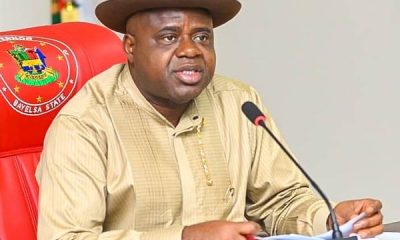Business
CBN Blames Crude Production Decline For Nigeria’s Economic Downturn

The Central Bank of Nigeria (CBN) says the decline in crude oil production output was the major reason why Nigeria’s economy in recent time has been down.
CBN Governor, Olayemi Cardoso, who revealed this in a release obtained on Monday, said the situation has transmitted shocks across the various sectors of the economy and shackling public finance.
In the release, Cardoso also outlined a chain of impact this output failure has caused to both fiscal and monetary policies.
He, however, indicated that his assignment and that of his fiscal policy colleagues was to tame the impact of this situation on the economy and the people.
‘‘In recent years, the continuous decline in Nigeria’s crude oil production has further weakened our already inadequate economic diversification.
“This has led to a decline in indicators, which has constrained our policy options.
‘‘Consequently, we have seen the fiscal deficit and public debt increase, placing additional strain on external reserves and contributing to exchange rate instability.
‘‘Addressing these challenges requires a well-crafted structural policy, complemented by coordinated monetary and fiscal policies”, he stated.
Explaining the policy measures taken so far to address these adversities, Cardoso hinted that turn-around to positive results is expected in the medium term.
“Th e removal of petrol subsidy and the adoption of a floating exchange rate, among other government policies, are anticipated to have positive effects on the economy in the medium term.
‘‘These measures are expected to enhance investor confidence, attract capital inflows, stimulate domestic investment, and ultimately improve the level of external reserves.
‘‘Additionally, they are expected to contribute to the stabilization of the domestic currency”, the CBN Governor said.
Giving a wider perspective to measures being taken to address the economic challenges facing Nigeria by the current Federal Government, Cardoso disclosed that during the 370th session of the Bankers’ Committee, he had highlighted the economic agenda of President Bola Ahmed Tinubu’s administration.
According to the agenda, he explained, the administration has set an ambitious goal of achieving a Gross Domestic Product (GDP) of $1.0 trillion over the next seven years, with clearly defined priority areas and strategies, and noted that the global trend supports the new direction of the apex bank.
By: Corlins Walter
Business
Tinubu’s RHI Doles Out N50m To 1,000 Kwara Petty Traders

Business
UBA To Educate SMEs, Business Owners On Withholding Tax

Business
Nigeria Losing $40b Annually From Maritime Sector – NIMENA
-
Business4 days ago
Aging Workforce May Erode Oil Industry Gains – NAPE
-

 Featured2 days ago
Featured2 days agoFG Suspends Max Air Operations For Three Months Over Kano Incident
-
Nation2 days ago
Rivers CP Eulogises LG Boss Over Donation Of Vehicles
-
Business4 days ago
NEITI Seeks Speedy Completion Of Refineries’ Rehabilitation
-
Politics2 days ago
Assembly Declares Lawmaker’s Seat Vacant Over Alleged Absenteeism
-
Business2 days ago
Aviation Stakeholders Raise Alarm Over NCAA Appointment Saga …Harp On Safety
-

 News4 days ago
News4 days agoBayelsa Confirms Cholera Outbreak
-

 Featured4 days ago
Featured4 days agoRSG Rolls Out Healthcare Programmes To Mark Fubara’s Birthday

